No One Wins Forever: Unpacking Game Theory and the Real Rules of Financial Competition
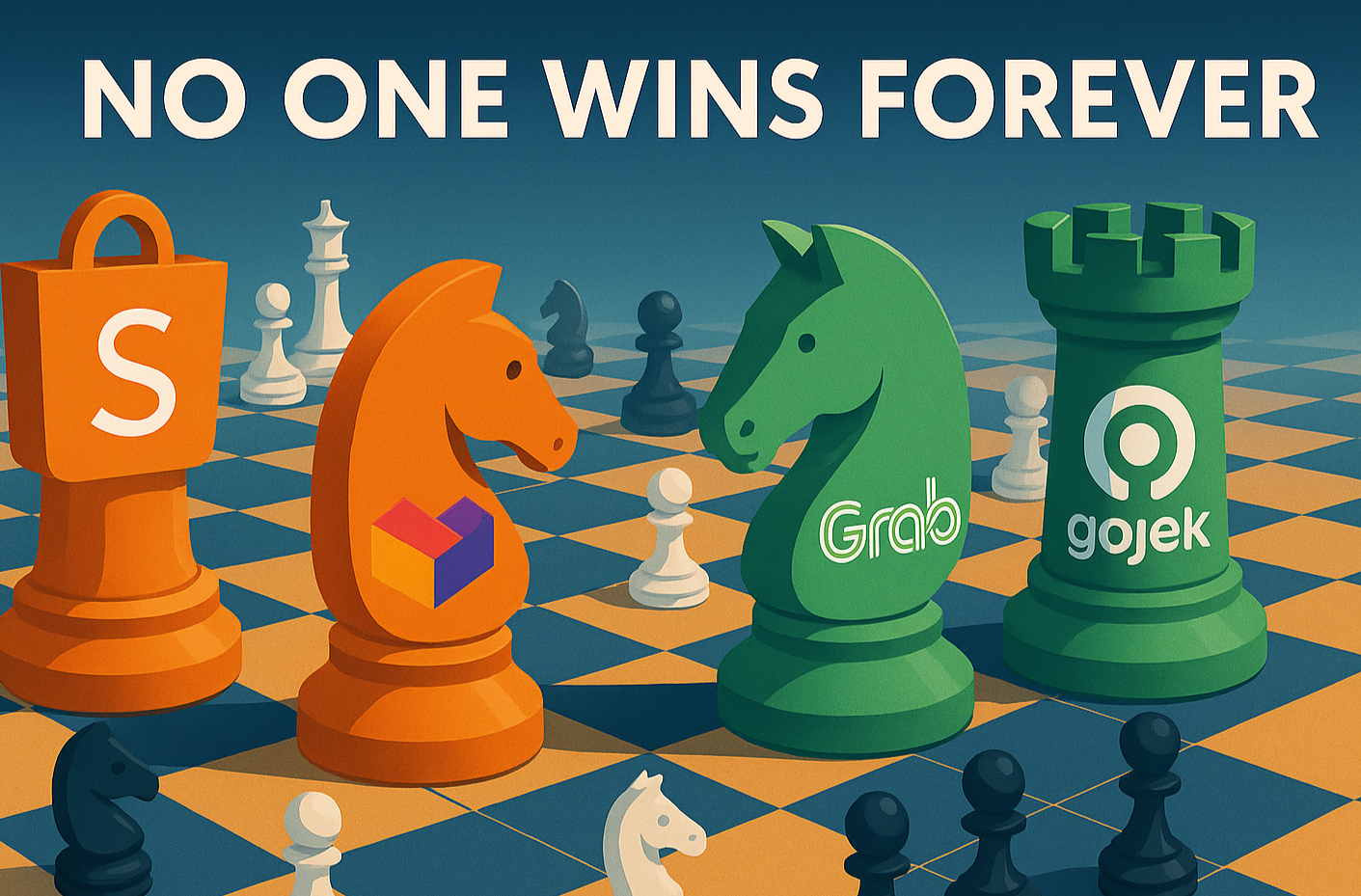
This article explores how game theory reveals the hidden logic behind competition in modern markets, showing that no business, no matter how dominant can win forever. Using Southeast Asian case studies like e-commerce price wars and ride-hailing battles, it explains how every strategic move triggers reactions, leading to cycles of adaptation, temporary advantage, and eventual equilibrium. The article unpacks practical concepts like the Red Queen Effect, Nash Equilibrium, the Prisoner’s Dilemma, first-mover advantage, and kingmaker dynamics offering actionable insights for investors, entrepreneurs, and decision-makers on how to survive and thrive in an ever-shifting business landscape where resilience, adaptation, and strategic thinking matter more than any single “winning” move.
Why Markets Aren't a Winner-Takes-All Game
The Billion-Dollar Burns
Consider the fierce price wars in Southeast Asian e-commerce. Platforms like Shopee and Lazada spent billions on free shipping and coupons to grab customers, burning nearly 5 billion baht (~$150 million) in a single year. Such aggressive tactics boosted market share in the short run, but they weren't sustainable eventually everyone had to pull back.
The Graveyard of Giants
The same pattern played out in ride-hailing. Uber's early dominance gave way after it fought costly battles in Asia. By 2018, Uber retreated and sold its Southeast Asia business to rival Grab. This illustrates a fundamental truth: no matter how big a player is, new challengers and counter-moves emerge.
Even giants that once ruled their industries found their positions overturned:
- Nokia: From 50% mobile market share to near-extinction
- BlackBerry: From corporate dominance to 0% market share
- Myspace: From 100 million users to irrelevance
The Perpetual Motion Machine
Why is this pattern so consistent? In competitive markets, every move provokes a response:
- Cut your prices → Rivals match them
- Launch a breakthrough service → Others scramble to imitate
- Secure a monopoly → Regulators intervene
This phenomenon mirrors biology's Red Queen Effect – organisms must constantly evolve just to maintain their position relative to co-evolving species. As venture capitalist Bill Gurley notes, "There's no finish line in business. The minute you think you've won, you've lost."
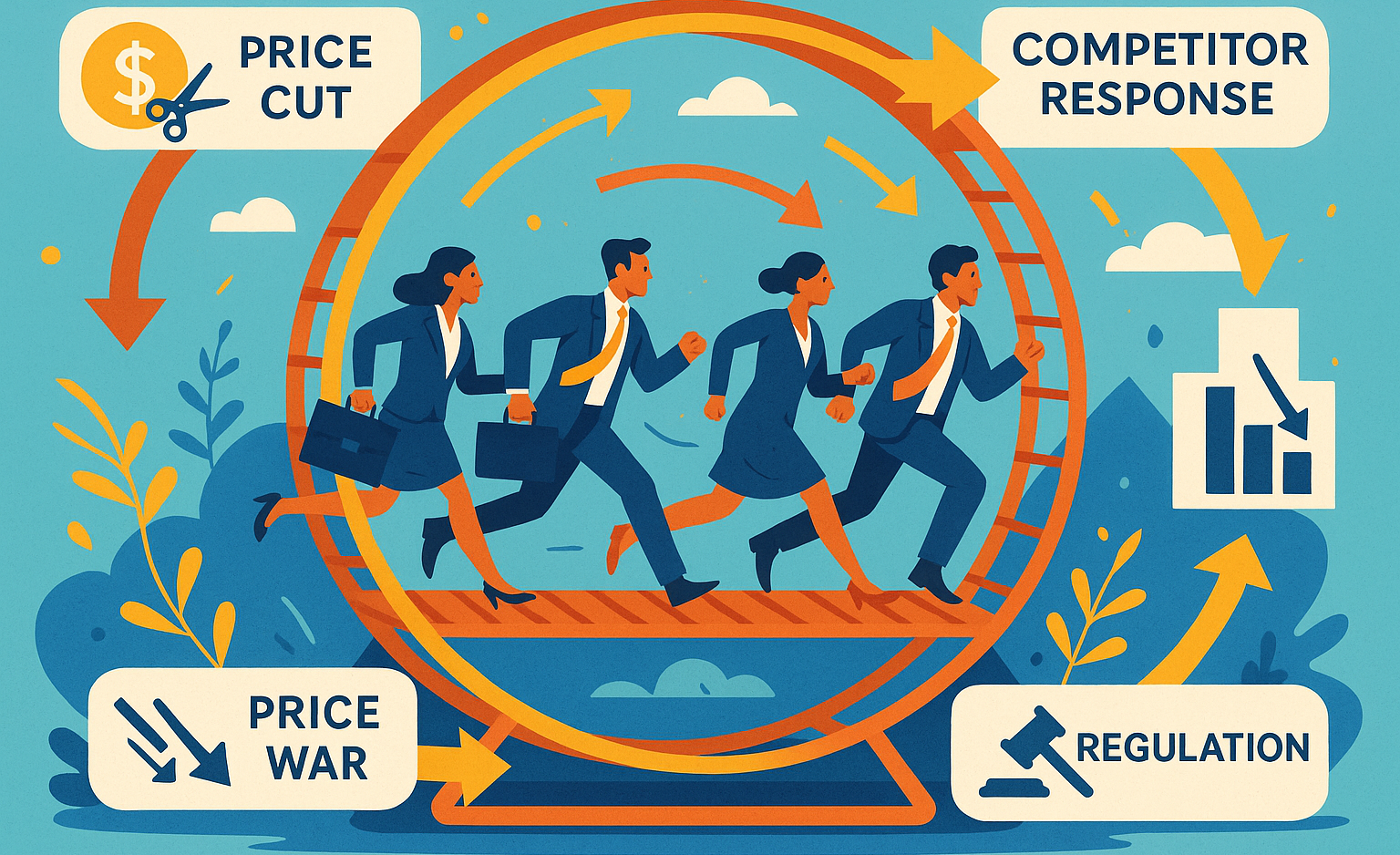
Enter Game Theory
This is where game theory becomes invaluable. It's not abstract mathematics, it's a practical framework for understanding competitive dynamics. Game theory provides tools to:
- Anticipate competitor reactions
- Identify stable market positions
- Plan multiple moves ahead
- Recognize when cooperation beats competition
The Core Insight: No one wins forever, but those who understand the rules of the game can survive and thrive through the cycles.
What is Game Theory? Real-World Foundations
The Science of Strategic Thinking
Game theory is the science of strategic decision-making when outcomes depend on what others do. Nobel laureate John Nash formalized key concepts, but the applications are intensely practical.
As Peter Thiel puts it: "Competition is for losers. If you want to create and capture lasting value, look to build a monopoly." Yet game theory shows us why even monopolies don't last every dominant position invites challenge.
The Nash Equilibrium: When Everyone's Stuck
The Nash Equilibrium represents a state where no player can improve their position by changing strategy alone. It's not necessarily optimal, often it's a trap everyone wishes they could escape.
Simple Example: Two coffee shops on the same street
- Both charge $5 → Comfortable profits
- One cuts to $3 → Steals customers
- Other matches $3 → Both make less money
- Nash Equilibrium: Both stuck at $3, neither can raise prices alone
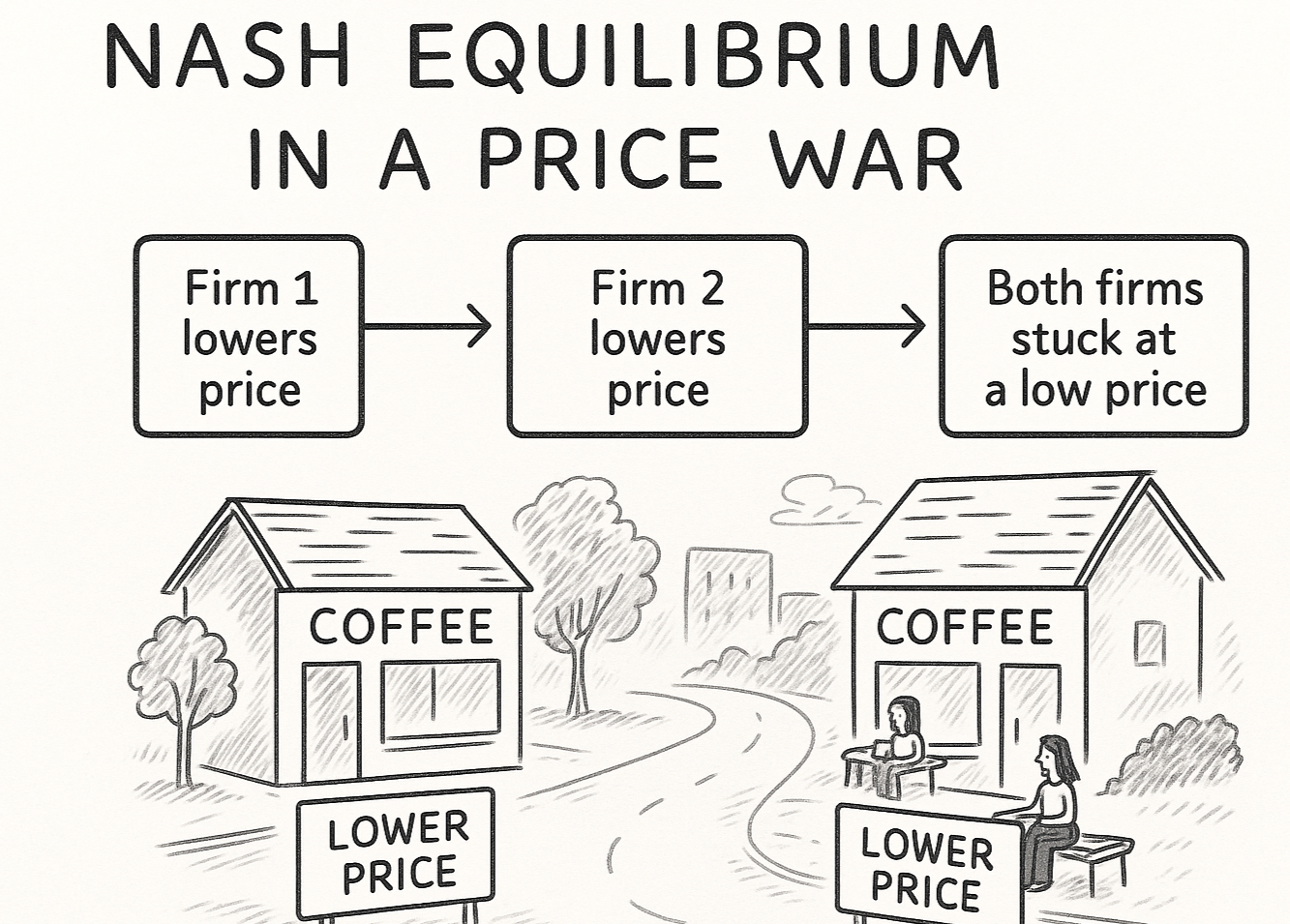
Real-World Game Theory in Southeast Asian Markets
1. The Parking Game
Players: Drivers seeking limited spots Strategies: Circle near entrance vs. park farther away Equilibrium: Mixed strategy – some circle, some walk Business Parallel: Market segmentation emerges naturally
2. Ride-Hailing Price Wars
The Setup: Grab vs Gojek vs Maxim
- Round 1: Grab cuts prices 40%
- Round 2: Gojek matches discounts
- Round 3: Both bleed cash
- Equilibrium: Discounts stabilize at 20-25%
3. Government Tender Bidding
The Dynamic:
- Bid too high → Lose contract
- Bid too low → Win but lose money ("Winner's Curse")
- Equilibrium: Bids cluster around break-even plus minimal margin
4. Stock Market Trading
High-Frequency Example:
- Algorithm A spots opportunity
- Algorithm B reacts in microseconds
- Arms Race Equilibrium: Billions spent on speed for marginal advantage
The Prisoner's Dilemma in Business
The famous thought experiment has direct business applications:
| Scenario | Both Cooperate | One Defects | Both Defect |
|---|---|---|---|
| Original | Light sentences | Defector free, other jailed | Heavy sentences |
| Price War | High prices, good profits | Price-cutter wins temporarily | Destructive competition |
| Real Example | OPEC production quotas | Saudi Arabia floods market | Oil price collapse |
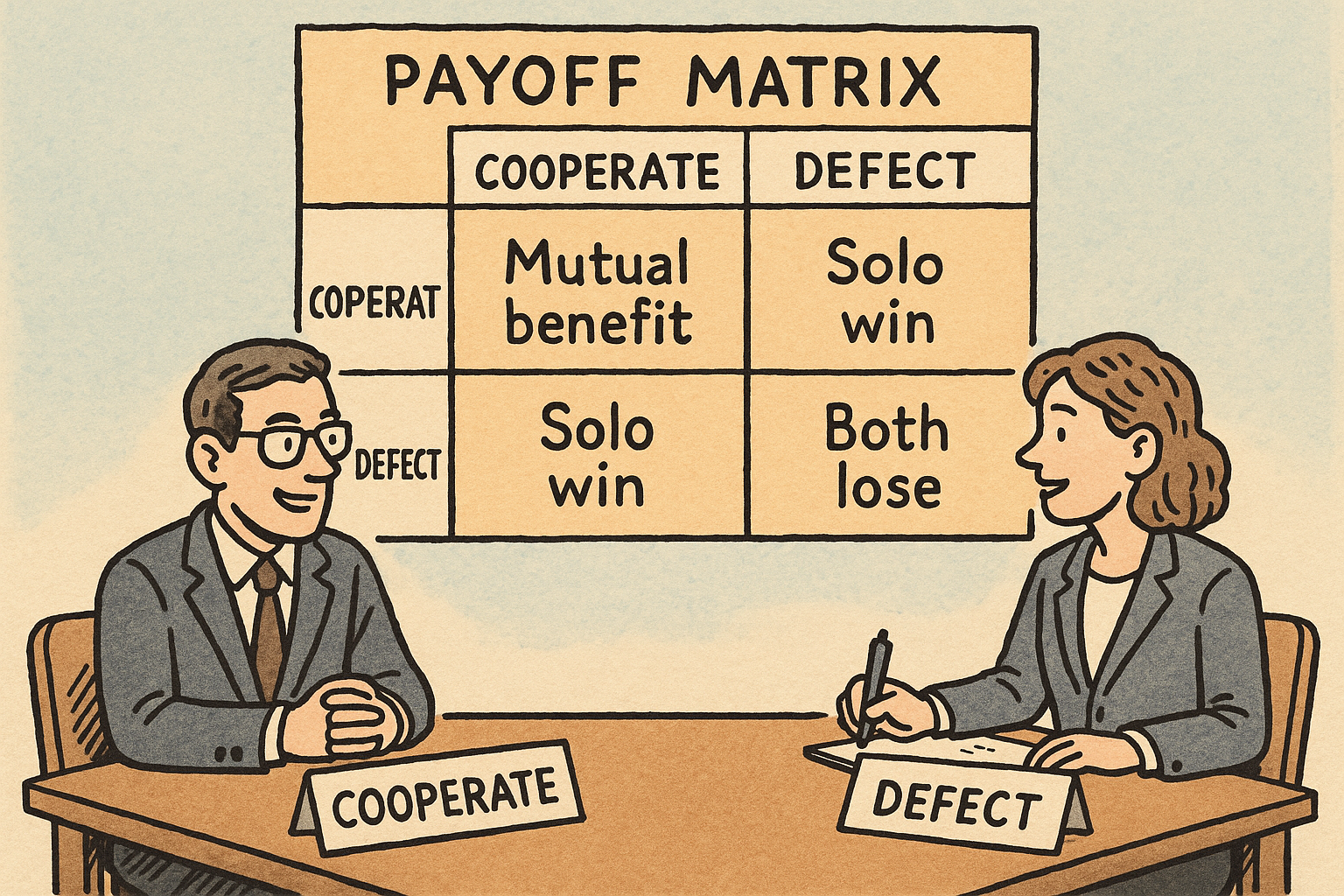
Indonesian economist Mari Pangestu observes: "In emerging markets, the temptation to defect is even stronger because market share today might mean market dominance tomorrow. But this thinking creates races to the bottom."
The Myth of the Eternal Winner: Why Every Strategy Gets a Reaction
Case Study: Indonesia's Ride-Hailing Wars
The Indonesian market provides a masterclass in competitive dynamics, documented extensively by researchers and analysts.
Phase 1: The Gold Rush (2015-2017)
The Players Enter:
- 2015: Gojek launches app-based ojek services
- 2016: Grab expands from Malaysia with heavy funding
- 2017: Uber joins the fray
The Weapons:
- Driver incentives reaching 700,000 IDR daily
- Customer discounts of 40-50%
- Venture capital burns exceeding $100 million quarterly
Phase 2: The Counterattacks (2017-2019)
Escalation Patterns:
- Service Wars: Rush into payments, food delivery, logistics
- Talent Poaching: Engineers' salaries triple
- Regulatory Battles: Lobbying for favorable rules
The Casualty:
- March 2018: Uber surrenders, sells to Grab for 27.5% stake
New Challenger:
- Maxim enters with 5-15% commission vs. standard 20%
- Forces incumbents to justify higher takes
Phase 3: The New Reality (2019-2023)
Market Adjustments:
- Government Intervention: 20% commission cap imposed
- Subsidy Reduction: Average discounts fall to 20-25%
- Super-App Pivot: Ecosystem building over price competition
Consolidation:
- 2021: Gojek + Tokopedia = GoTo Group
- Creates $18 billion entity to compete with Grab
Current State (2024-2025)
Market Structure:
- Gojek: ~52% mobility spending share
- Grab: ~48% mobility spending share
- Low user overlap – loyalty solidifying
- Focus shifts from growth to profitability
The Action-Reaction Cycle
| Player | Bold Move | Market Response | Unintended Consequence |
|---|---|---|---|
| Gojek | Massive driver bonuses | Competitors forced to match | Unsustainable burn rates |
| Grab | Regional expansion | Gojek allies with Tokopedia | Arms race in features |
| Maxim | Rock-bottom commissions | Pressure on all margins | Race to profitability slows |
| Government | Commission caps | Business model evolution | New competitive dimensions |
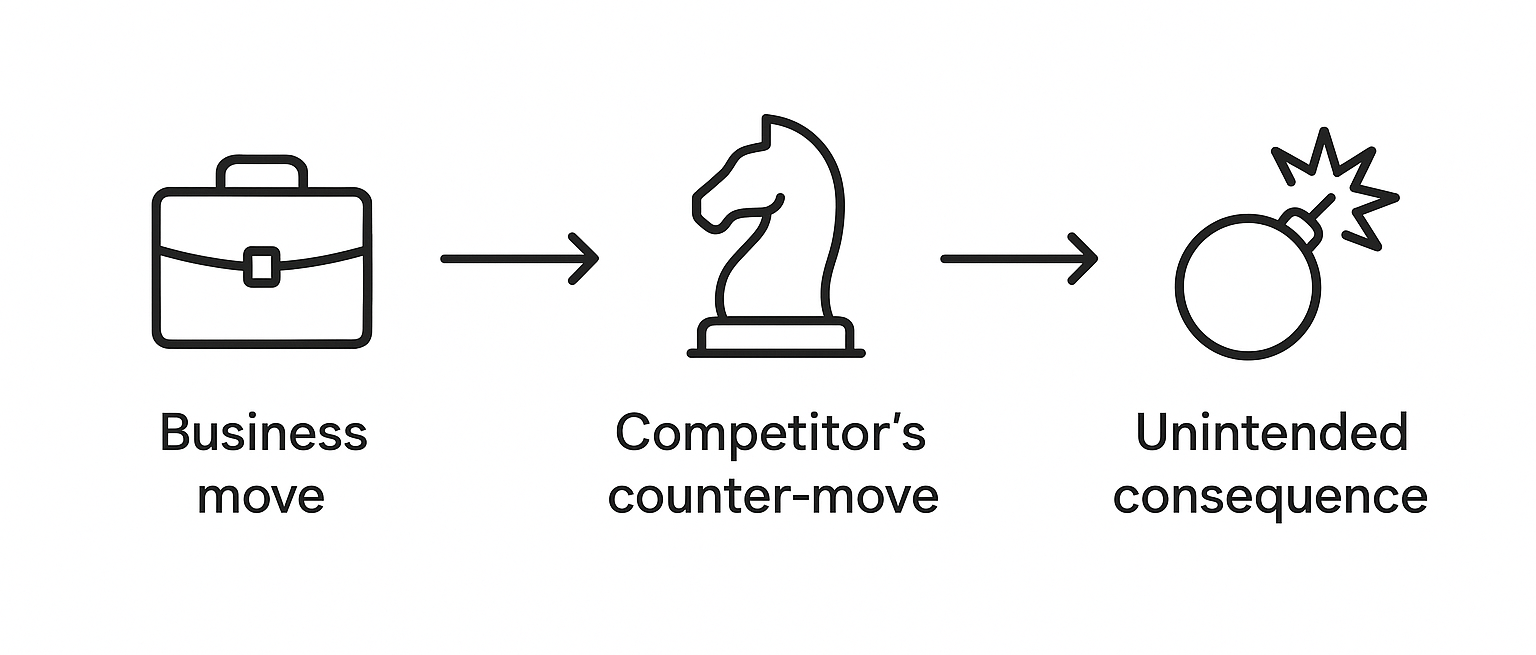
Lessons from the Battlefield
Former Grab executive explains: "Every Monday we'd analyze Gojek's moves from the previous week. By Tuesday, we'd have counterstrategies. They were doing the same. It was exhausting and expensive."
This validates game theory's core principle: every strategy gets a reaction. The key isn't finding an unbeatable strategy – it's staying ahead in the move-countermove cycle.
Nash Equilibrium in the Market: When Stability Beats a Single Victory
The Paradox of Stability
Markets often settle into Nash equilibria – stable but not necessarily optimal states. These equilibria can be more sustainable than outright victory.
Example 1: The E-commerce Détente
The Subsidy Wars (2015-2020):
- Shopee, Lazada, Tokopedia burn billions
- Free shipping becomes table stakes
- Customer acquisition costs skyrocket
The Turning Point: "We realized we were in a prisoner's dilemma. Everyone was losing money to maintain share. Someone had to blink first." – Anonymous e-commerce executive
New Equilibrium (2021-Present):
- Gradual fee introduction
- Focus on seller services
- Market shares stabilize: Shopee ~50%, Lazada ~20%
Example 2: Digital Wallet Stalemate
The Race to Zero:
- 2018-2020: Zero transaction fees everywhere
- User acquisition via cashbacks
- Monthly burns exceeding $10 million per player
Current State:
- Modest fees now standard
- Cashbacks largely eliminated
- Players focus on specific niches
Why Equilibrium Emerges
1. Investor Reality SoftBank's Masayoshi Son learned the hard way: "Unlimited capital doesn't guarantee victory. Sometimes it just raises the cost of competing."
2. Regulatory Pressure When competition becomes destructive, governments intervene:
- Indonesia's ride-hailing commission caps
- Thailand's e-payment regulations
- Singapore's delivery rider protections
3. Operational Limits Quality suffers under extreme cost pressure:
- Delivery delays
- Driver shortages
- Customer service deterioration
The Bertrand Paradox in Practice
Economic theory suggests perfect competition drives prices to marginal cost. Reality is messier:
Theory: Two identical firms should price at cost Reality: Differentiation prevents complete commoditization
- Grab emphasizes safety features
- Gojek leverages local partnerships
- Service quality becomes the new battlefield
Dynamic Equilibria: The Only Constant is Change
| Disruption | Example | Impact |
|---|---|---|
| New Technology | AI-powered routing | 15% efficiency gains change unit economics |
| Regulatory Shift | Foreign ownership limits | Forces partnerships or exits |
| Black Swan | COVID-19 | Accelerated digital adoption by 3-5 years |
| New Entrant | TikTok Shop | Forces e-commerce innovation |
Can You Still Win? The Power of First Movers & Kingmakers
First-Mover Advantage: Myths and Realities
The Success Stories
| Company | First Move | Still Leading? | Success Secret |
|---|---|---|---|
| Amazon | Online books (1995) | Yes | Relentless innovation |
| Search algorithm | Yes | Network effects + R&D | |
| Alibaba | Chinese e-commerce | Yes | Ecosystem building |
| Garena | SE Asian gaming | Yes | Local content focus |
The Cautionary Tales
| Company | First Move | What Happened | Lesson |
|---|---|---|---|
| Friendster | Social networking | Facebook won | Execution > Timing |
| Altavista | Web search | Google dominated | Technology edge matters |
| Multiply | Philippine social commerce | Closed 2013 | Local wasn't enough |
Reid Hoffman's Insight: "First-mover advantage is like a decaying isotope. It has a half-life. You need to compound it with other advantages before it expires."
The Kingmaker Effect
Kingmakers can tip competitive balance without competing directly:
1. The SoftBank Factor
Portfolio Approach:
- Invested in Uber, Grab, Didi, Ola
- Orchestrated market divisions
- Brokered Uber's SEA exit to Grab
Impact: "SoftBank doesn't pick winners. It creates them." – Tech analyst
2. Government as Kingmaker
Singapore Example:
- Chose Grab for government services integration
- Provided regulatory sandbox
- Result: Grab's regional HQ advantage
Indonesia's Influence:
- Tokopedia merger approval for Gojek
- Created national champion GoTo
- Shifted competitive dynamics overnight
3. Technology Partners
Critical Dependencies:
- Payment gateways choosing exclusive partners
- Cloud providers offering special rates
- Map data licensing determining route quality
Strategic Implications
For Entrepreneurs:
- First-mover advantage is a melting ice cube – use it fast
- Fast followers can win with better execution
- Kingmaker relationships often matter more than customer acquisition
For Investors:
- Evaluate defensive moats, not just growth
- Watch for kingmaker alignments
- Assume successful strategies will be copied
Practical Takeaways for Investors, Entrepreneurs, and Decision Makers
1. Think in Systems, Not Snapshots
The Chess Master's Mindset:
- Current position matters less than possible futures
- Every move changes the entire board
- Opponents are thinking several moves ahead too
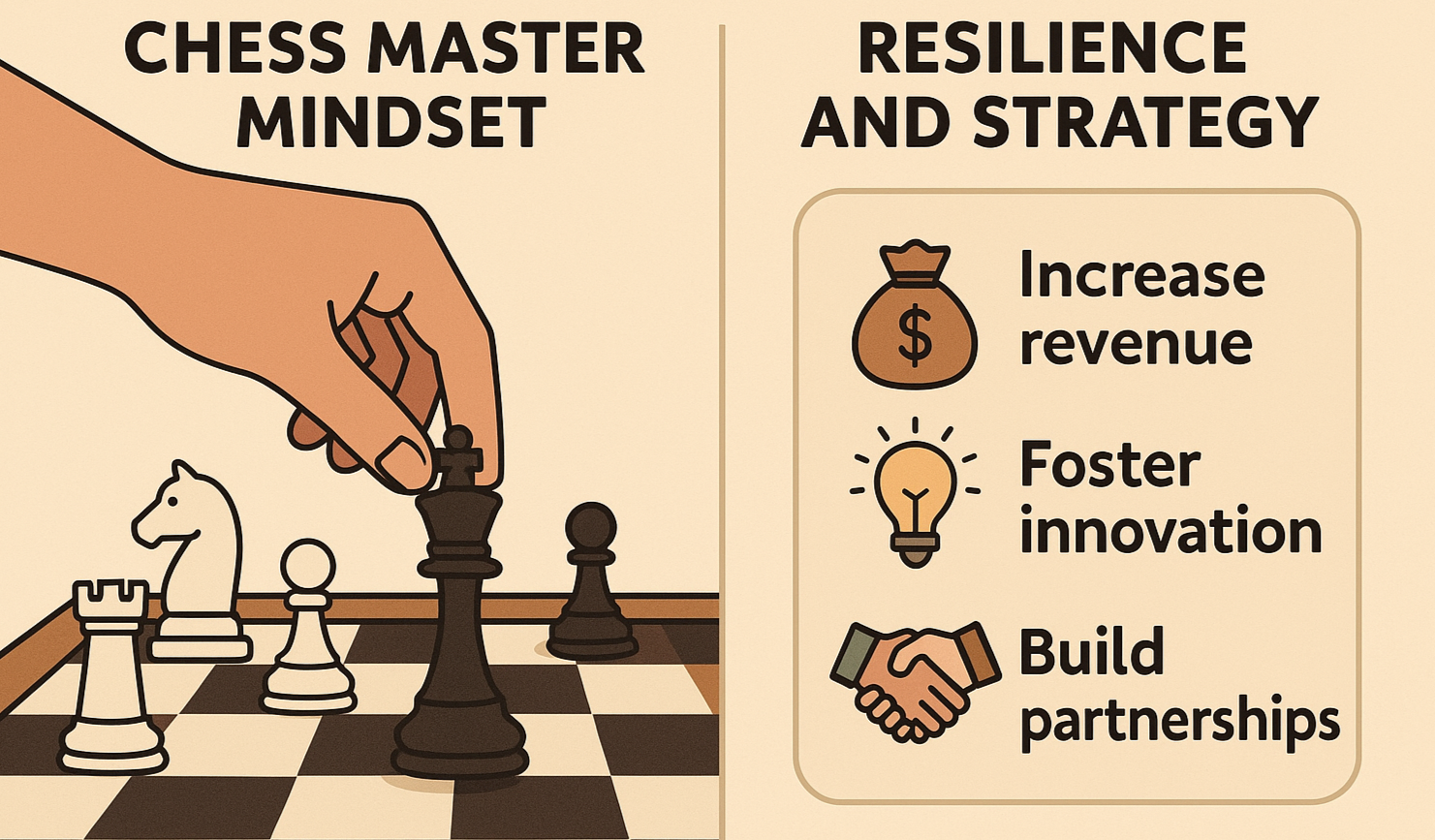
Practical Framework:
🗺️ Map likely competitor responses
♻️ Plan your counter-responses
🚀 Identify game-changing moves
🤝 Consider cooperation opportunities
2. Build Adaptive Capacity
Netflix's Reed Hastings: "Most companies fail not because they do the wrong thing, but because they keep doing what was once the right thing for too long."
Adaptation Mechanisms:
- Quarterly strategy reviews with competitive scenarios
- Fast decision-making processes
- Resource reserves for quick pivots
- Culture that celebrates intelligent failures
3. Master Market Intelligence
Essential Monitoring Rhythms:
| Signal Type | Frequency | Why It Matters |
|---|---|---|
| Pricing changes | Daily | Immediate response needed |
| New features | Weekly | Innovation tracking |
| Partnerships | Monthly | Strategic shifts |
| Regulatory moves | Quarterly | Game rule changes |
| Leadership changes | As announced | Strategy pivots likely |
4. Balance Competition with Cooperation
When to Compete:
- Core differentiation
- Customer acquisition
- Brand positioning
When to Cooperate:
- Market education
- Regulatory advocacy
- Infrastructure building
- Technology standards
Example: Indonesian fintech players jointly funded financial literacy programs while competing fiercely on products.
5. Plan for Multiple Horizons
The Three-Horizon Model:
- Horizon 1: Defend current business (70% resources)
- Horizon 2: Build emerging opportunities (20% resources)
- Horizon 3: Create future options (10% resources)
6. Develop Strategic Resilience
The Resilience Formula:
- Multiple revenue streams
- Strong unit economics
- Customer switching costs
- Continuous innovation
- Strategic partnerships
- Regulatory relationships
- Financial reserves
Jack Ma's Wisdom: "Today is hard, tomorrow will be worse, but the day after tomorrow will be sunshine. Most people die tomorrow evening."
7. Embrace Selective Battles
The Art of Strategic Focus:
- You can't win every battle
- Choose battles that matter most
- Sometimes retreat is advancement
- Preserve resources for decisive moments
Conclusion: Embrace the Game, Play to Endure
The journey through game theory and market competition reveals profound truths about business strategy. "No One Wins Forever" isn't defeatism, it's liberation from the futile pursuit of permanent dominance.
The Meta-Lessons
1. Competition is Infinite There's no final victory in business. Success means staying in the game and thriving through endless cycles of innovation and adaptation.
2. Equilibrium is Everywhere Markets naturally settle into stable patterns. Understanding these equilibria and what disrupts them provides strategic advantage.
3. Every Action Has Reactions Strategic thinking means anticipating not just the first-order effects of your moves, but the second and third-order responses they trigger.
4. Adaptation Beats Prediction In complex systems, the ability to adapt quickly matters more than perfect foresight.
5. Cooperation Can Beat Competition Sometimes the best move is finding win-win scenarios rather than zero-sum battles.
The Southeast Asian Context
Our region's markets exemplify these dynamics with particular intensity:
- Rapid growth amplifies competitive cycles
- Regulatory environments remain fluid
- Digital transformation compresses timeframes
- Local knowledge provides real advantage
- Ecosystem strategies prove especially powerful
The Final
As Charles Darwin never actually said (but should have): "It is not the strongest of the species that survives, nor the most intelligent, but the one most responsive to change."
In the grand game of business, there are no permanent winners or losers, only players who understand the game and those who don't. Master the game, and you master your fate. The game never ends, but that's precisely what makes it worth playing.